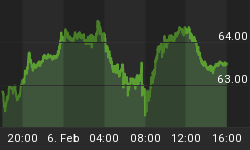I was surprised in December when the most dovish central banker ever to lead the Fed allowed the body to implement a tightening, so perhaps I shouldn't be surprised now that she is staunchly resisting an increasingly-raucous chorus of hawks. Prior to the Fed's last meeting, I noted that if there was ever an excuse for tightening, unemployment being around 5% with core CPI above 2% while emergency measures still remain in place from the last crisis was probably a pretty good one. When the Fed eschewed action at the meeting, I scratched my head even though I wasn't totally shocked. Yellen is a dove, and an unrepentant one at that. Despite all efforts to rehabilitate her image in that regard, the truth remains.
But her arguments are getting increasingly weak. Her argument seems to be that if domestic growth is weak, then even if inflation is rising the Fed will maintain the extraordinary measures as long as inflation is not yet at disturbing levels, or if the inflation is believed to be transient. Okay, fair enough - I believe it's the wrong tine of the fork to focus on, since in the long run growth is maximized when inflation is low, stable, and predictable (as Greenspan once was fond of reminding us) and because the Fed can actually control inflation through monetary policy while there is little evidence they can control real growth. But still, it's a point that many at the Federal Reserve would agree with.
However, in her remarks on Tuesday Yellen went further and pointed to weakness in other parts of the world where the Fed clearly has no direct mandate but also where it isn't clear the weakness isn't a net positive for the US in terms of our growth/inflation tradeoff. Lower energy prices due to weak growth in Europe and China, for example, has a positive impact on the United States which almost certainly outweighs the decline in our exports to those countries.
Yellen's argument sounds a lot like what you will sometimes hear around bonus time at a large company (and perhaps here I will reveal lingering frustrations of my own!). In some companies, what you hear at bonus time if your group or your particular project did really well is "you did well, but we can't pay you as much as it deserves because the firm/the division/the group came in below plan." At the same organization, if your group or your project did poorly while the overall firm had a banner year, the bonus time discussion will begin with "well, as you know you didn't perform well..."
Growth will always be weak somewhere in the world. Soon enough, it will probably be weak here. But even when it weakens here it is not likely to be so weak that we continue to need extraordinary liquidity provision such as that which is currently in place.
Yes: to me, the bigger issue is the size of the Fed's balance sheet and the global pile of excess reserves. Higher interest rates from the central bank are not only not a cure, they make the problem worse by causing money velocity to increase. But I would be somewhat less uncomfortable if there was any indication that the Fed had some sense of urgency on the inflation front.
In any event, if the Fed does not raise rates in April then it means it will be at least 6 months between 25bp rate increases. At that rate, it would be about six years until the short rate returned to something like a normal level. But that's irrelevant - because a change in rates every six months cannot be seriously called a tightening "campaign."
The Fed's credibility erodes further with every passing day. The good news is that there isn't much left to erode.
You can follow me @inflation_guy!
Enduring Investments is a registered investment adviser that specializes in solving inflation-related problems. Fill out the contact form at http://www.EnduringInvestments.com/contact and we will send you our latest Quarterly Inflation Outlook. And if you make sure to put your physical mailing address in the "comment" section of the contact form, we will also send you a copy of Michael Ashton's book "Maestro, My Ass!"















